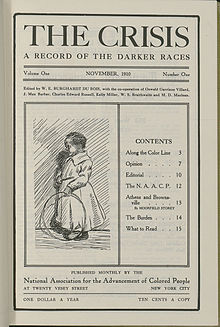The Crisis

First Issue of The Crisis: A Record of the Darker Races, November 1910. New York: NAACP, 1910
|
|
| Editor | Jabari Asim |
|---|---|
| Former editors |
W. E. B. Du Bois Roy Wilkins James W. Ivy Henry Lee Moon Warren Marr II Chester Higgins, Sr. Maybelle Ward Fred Beauford Garland Thompson Denise Crittendon Gentry Trotter Paul Ruffins Ida F. Lewis Phil Petrie Victoria Valentine |
| Frequency | Monthly |
| Publisher | NAACP |
| First issue | November 1910 |
| Company | The Crisis Publishing Company |
| Country | United States |
| Based in | New York, NY |
| Language | English |
| Website | www |
| ISSN | 1559-1573 |
W. E. B. Du Bois Roy Wilkins James W. Ivy Henry Lee Moon Warren Marr II Chester Higgins, Sr. Maybelle Ward Fred Beauford Garland Thompson Denise Crittendon Gentry Trotter Paul Ruffins Ida F. Lewis Phil Petrie
The Crisis is the official magazine of the National Association for the Advancement of Colored People (NAACP). It was founded in 1910 by W. E. B. Du Bois (editor), Oswald Garrison Villard, J. Max Barber, Charles Edward Russell, Kelly Miller, W. S. Braithwaite, and M. D. Maclean. The Crisis has been in continuous print since 1910, and it is the oldest black publication in the world. Today, The Crisis is "a quarterly journal of civil rights, history, politics and culture and seeks to educate and challenge its readers about issues that continue to plague African Americans and other communities of color."
The original title of the magazine was The Crisis: A Record of The Darker Races. The magazine’s name was inspired by James Russell Lowell’s 1844 poem, "The Present Crisis". The suggestion to name the magazine after the poem came from one of the NAACP co-founders and noted white abolitionist Mary White Ovington.
As the founding editor of The Crisis, Du Bois proclaimed his intentions in his first editorial:
"The object of this publication is to set forth those facts and arguments which show the danger of race prejudice, particularly as manifested today toward colored people. It takes its name from the fact that the editors believe that this is a critical time in the history of the advancement of men. …Finally, its editorial page will stand for the rights of men, irrespective of color or race, for the highest ideals of American democracy, and for reasonable but earnest and persistent attempts to gain these rights and realize these ideals." (The Crisis, November 1910, 10)
Although The Crisis was officially an organ of the NAACP, Du Bois had a large degree of control over the periodical's expressed opinion. Du Bois wrote in Dusk of Dawn (1940) that he intended for The Crisis to represent his personal opinions:
...
Wikipedia
